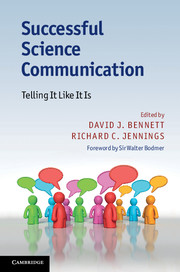Book contents
- Frontmatter
- Contents
- Foreword
- Authors' biographies
- Introduction Public engagement in an evolving science policy landscape
- Part I What it helps to know beforehand
- 1 Deficits and dialogues: science communication and the public understanding of science in the UK
- 2 Explaining the world: communicating science through the ages
- 3 Science: truth and ethics
- 4 The public's view of science
- 5 The common language of research
- 6 Not 100% sure? The ‘public’ understanding of risk
- 7 The ethos of science vs. ethics of science communication: on deficit and surplus models of science–society interaction
- Part II Policy-makers, the media and public interest organisations
- Part III What you can do and how to do it
- Part IV And finally, evaluating and embedding science communication
- Index
- Plate section
- References
3 - Science: truth and ethics
Published online by Cambridge University Press: 05 May 2013
- Frontmatter
- Contents
- Foreword
- Authors' biographies
- Introduction Public engagement in an evolving science policy landscape
- Part I What it helps to know beforehand
- 1 Deficits and dialogues: science communication and the public understanding of science in the UK
- 2 Explaining the world: communicating science through the ages
- 3 Science: truth and ethics
- 4 The public's view of science
- 5 The common language of research
- 6 Not 100% sure? The ‘public’ understanding of risk
- 7 The ethos of science vs. ethics of science communication: on deficit and surplus models of science–society interaction
- Part II Policy-makers, the media and public interest organisations
- Part III What you can do and how to do it
- Part IV And finally, evaluating and embedding science communication
- Index
- Plate section
- References
Summary
Introduction
People are inquisitive. It is only natural to ask what the world is made of, and how it works. These questions have occupied humankind for millennia – they were among the central questions asked in the earliest years of philosophical inquiry. What we now call science has its origins in the efforts made to answer these questions. And when we now ask these questions it is to science that we turn. People are interested in science for what it tells them about the world in which they live – what it is made of, and how it works. Science communication surely has a role in satisfying this natural curiosity, in fulfilling this need. We trust the scientist to tell us truly about the world and we value science for what it tells us. We welcome the light that it can cast on our understanding of the world.
But in generating knowledge of the world, especially knowledge of how it works, the scientist also acquires the ability to do things, to make things happen. We are often surprised by what can be done – technology, the uses of science, is another great interest we have in science. And this too is something that we want to know about – we want to know what can be done with science and what is going to be done with it. We appreciate the many benefits that science, engineering and technology (SET) have bestowed upon humanity, but we are also wary of the dangers that can result from ill-considered uses of science. For that reason we are not so entirely trusting of science in its uses. The fruits of science are often sweet, but sometimes they are bitter.
- Type
- Chapter
- Information
- Successful Science CommunicationTelling It Like It Is, pp. 45 - 59Publisher: Cambridge University PressPrint publication year: 2011



